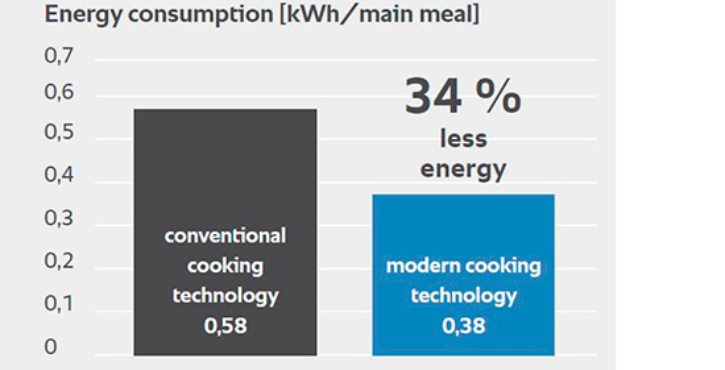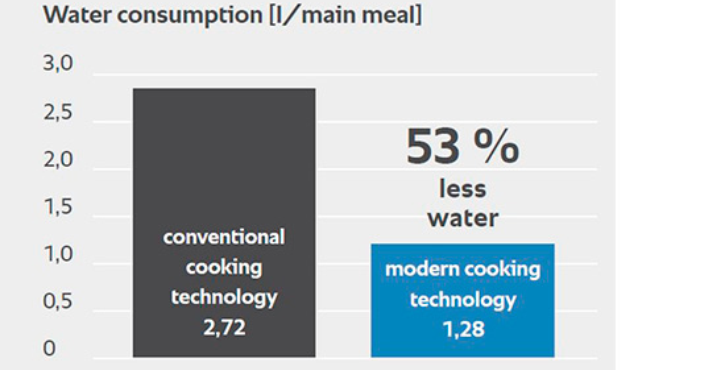EU Sustainable Energy Week, which takes place every year from 30 May to 5 June, focuses on economic, social and environmental challenges at an international level. The week of action is based on Agenda 2030, which has been signed by all of the UN member states and sets out 17 goals for sustainable development.
Commercial kitchens fall within the scope of the 12th goal in this concept, which is "To ensure sustainable consumption and production patterns".
Cooking uses up a great deal of water and electricity. As such, professional kitchens can cut back on precisely these resources, as borne out by a critical look at kitchen equipment: conventional tilting pans, boiling pans and deep-fat fryers all have high consumption values. One resource-saving alternative is to use a multifunctional cooking appliance for these tasks. Not only does this save space, but it also brings down the amount of money spent on electricity and water. We have developed just such a multifunctional cooking appliance in the form of the VarioCookingCenter®, which can cook, roast and fry food, thus consuming up to 40% less electricity than conventional cooking appliances. This is ensured by the powerful VarioBoost® heating system, which has a net-like structure that distributes the heat evenly to the food via the pan base. Water usage is also reduced, as fewer or indeed no pots and pans need to be cleaned.
Research by Zurich University provides evidence of significant savings for kitchens using multifunctional cooking appliances.

Until now, the standard for energy efficiency (DIN 18873, http://grosskuechen.cert.hki-online.de/en) has been the only decision aid for buyers of commercial cooking appliances, except for manufacturer information. So the specific savings resulting from upgrading to new kitchen technology are unclear. For this reason, FRIMA International AG, as the market leader in multifunctional cooking technology and part of the RATIONAL Group decided to undertake a project with Zurich University for Applied Sciences, under the supervision of Prof. Dr.-Ing. Heinzelmann and SV Schweiz (Swiss catering and hotel management corporation). The aim of the project was to record the efficiency of multifunctional cooking technology under real conditions, with a ‘before and after’comparison based on the most accurate possible measuring equipment.
The staff restaurant of ABB Schweiz AG (manufacturer of energy and automation technology) in Dättwil-Baden operated by SV Schweiz was selected for the research project. In spring 2014, the restaurant produced around 380 lunches daily, using the cook-and-hold method,with a menu choice of four different dishes. At the start of the project in April 2014, conventional technology was still being used and measurements of energy and water consumption were taken over a period of eight weeks. The number of main meals, the menu, food waste and over-production were also logged. The measurements showed the following requirement per main meal served:0.58 kWh of electricity and 2.72 litres of water.(Dish-washing requirements were not considered in this study.)

The kitchen renovation and installation of modern cooking technology from FRIMA and RATIONAL began in summer 2014. Measurements of energy and water consumption were then taken again, in order to enable the ‘before and after’ comparison. The measurements showed a significant reduction in consumption per main meal. Energy consumption dropped by 34 %, meaning only 0.38 kWh per main meal was now required. This corresponds to a reduction in annual CO2 emissions of 1.8 tons. For water, consumption was only 1.28 litres per main meal, which was 53 % less than before.

The project proved that modern cooking technology can optimise the use of resources, reducing energy and water consumption significantly. What’s more, the staff restaurant was also able to increase the range of meals it offered, thanks to the expansion of cooking options. “Thanks to these cost savings we were able to create an attractive front-of-house cooking concept, with a pizza oven and a pasta machine and boiler, without needing any extra budget,” says Anton Bucher, Project Manager Planning & Construction SV Schweiz. “This creates a culinary experience and an attractive atmosphere, not only for our guests but also for the restaurant staff themselves.”